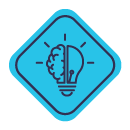
What Leaders Need to Succeed: Top Trends Shaping 2025
Jan 27, 2025
Leading through uncertainty has become par for the course for leaders over the last five years. From unprecedented disruption due to a global pandemic and whiplash inducing work model changes, to global instability and rapid technological advancement, leaders have been tasked with keeping things steady while the world feels anything but.
Wiley Workplace Intelligence wanted to see what was on the minds of leaders everywhere and surveyed 2,000 people, asking what leadership skills will be the most important in 2025? We also wanted to know what trends are emerging that will shape workplaces in the coming year. It’s no surprise that AI remains top of mind as the widespread integration of AI capabilities has started to impact every corner of the professional world. Read on to learn more about what leaders need to stay ahead of the curve in the coming year.
Wiley Workplace Intelligence wanted to see what was on the minds of leaders everywhere and surveyed 2,000 people, asking what leadership skills will be the most important in 2025? We also wanted to know what trends are emerging that will shape workplaces in the coming year. It’s no surprise that AI remains top of mind as the widespread integration of AI capabilities has started to impact every corner of the professional world. Read on to learn more about what leaders need to stay ahead of the curve in the coming year.
Top Three Leadership Skills Needed in 2025
-

Strategic Vision and Planning
-

Effective Communication
-

Change Management
Our respondents shared that strategic vision and planning, effective communication, and change management skills are anticipated to be the top three skills needed to lead in the coming year. That is unsurprising considering looming uncertainty across the board.
Looking ahead, strategic thinking will be particularly important as leaders navigate rapid technological advancement with AI, as well as anticipated market shifts, and ongoing global challenges. Strategic thinking will be critical as it will help anticipate change, help make informed decisions and align teams with shifting priorities which will ensure growth and flexibility in an increasingly complex environment.
Communication has always been important but will be undoubtedly vital in the coming year. Exemplary leaders focus on connecting with their teams, ensuring clear communication around expectations, goals, and the future to strengthen relationships and boost morale. Communication is imperative when building trust across hybrid teams, as well as aligning around organizational goals in rapidly evolving situations.
As leaders have learned over the last five years, the only constant is change, and learning effective change management is a crucial piece of the leadership puzzle in the coming year. Leaders who prioritize communicating through change will help minimize potential disruptions, maintain morale, and ensure smooth transitions when they happen, which boosts resilience in the long term. Change management includes communication plans to engage people in the process early on to increase awareness and encourage adoption.
How Leaders Can Model the Way During AI Integration
-

AI Integration
-

Workforce
Challenges -

Economic
Uncertainty
-

Automation
-

Innovation and
Customer-Centric
Approach
According to our respondents, the following are the top five trends shaping work across industries in 2025.
AI Integration: Transforming the World of Work
AI integration is revolutionizing industries by improving efficiency, scalability, and customer engagement. Across many industries, AI technologies are being implemented to automate repetitive tasks, help with data analytics, and enhance decision making.
While these innovations can be exciting, they can also be equally as daunting. As AI expands its reach, organizations that harness its full potential, while maintaining the human elements of work like skills and leadership development and interpersonal connection, will be able to scale their operations more effectively. Providing training and clear expectations around AI implementation will help leaders ease this transition in their organizations.
Workforce Challenges: Upskilling, Retention, and Hybrid Work Environments
As the workplace continues to evolve, new workforce challenges have emerged. One of the most pressing issues is upskilling employees to ensure they have the tools they need to succeed in a rapidly changing work environment. Leaders must invest in continuous learning initiatives to provide their teams with the necessary skills to work alongside advanced technologies. Upskilling not only helps improve employee performance but also plays a significant role in retention. Investing in training opportunities such as leadership development, will help individual growth while also promoting a leadership mindset at all levels which will be invaluable in this tumultuous era.
Companies that offer opportunities for growth and development are more likely to retain top talent. Additionally, hybrid work environments have become prevalent as organizations bring people back into the office while attempting to maintain flexibility. Offering flexible work options attracts diverse talent and improves employee satisfaction, helping organizations access a broader pool of candidates while accommodating shifting workforce expectations.
Economic Uncertainty: Navigating Regulatory and Global Changes
Economic uncertainty remains a critical challenge for leaders in 2025. Fluctuating economic conditions, evolving industry regulations, and external disruptions require organizations to be adaptable and forward-thinking. In the face of these uncertainties, leaders must be able to anticipate market shifts and navigate complex changes quickly. Leaders who can adapt to evolving conditions while maintaining a steady course will be better positioned to weather these changes.
Automation: Reshaping Production and Advancing Sustainability
Automation is fundamentally reshaping what work looks like in many industries. By automating routine tasks and processes, organizations can achieve greater operational efficiency, reduce human error, and cut costs. In addition, automation plays a significant role in driving global sustainability initiatives. Automated systems can optimize energy usage, minimize waste, and streamline resource management, contributing to more sustainable business practices.
As consumers increasingly demand eco-friendly solutions, companies that embrace automation and sustainable practices will gain a competitive edge. For leaders, it’s important to leverage human talent to guide automation and boost productivity.
Innovation and a Customer-Centric Approach: Data Driven Insights
Innovation will be essential for leaders in 2025, with a focus on customer-centric approaches that prioritize personalized experiences. Again, this year will be all about finding a balance between the benefits technology can provide and the human elements that cannot be replicated by a machine, such as creativity, leadership, and interpersonal skills.
As consumer preferences become more individualized, businesses are increasingly turning to innovative solutions that cater to specific customer needs, whether through tailored products, services, or digital experiences. Leaders who prioritize customer-centric innovation, supported by data insights, will be able to not only meet customer expectations but also fuel strategic growth, positioning their organizations for long-term success.

Only 15% of employees are aware of a clear strategy for AI implementation.
While it feels as if we are embarking on an uncertain journey over the next year in many ways, exemplary leaders can continue to strike a balance between the modeling the way in their organizations while putting an emphasis on challenging the process and inspiring a shared vision for an exciting future of business where uncertainty meets limitless potential.
Wiley’s suite of professional solutions provides a structure and common language to help empower entire organizations with the skills needed to get to the next level. From unlocking the power of leadership at every level with The Leadership Challenge®, building better teams with The Five Behaviors®, improving understanding to create engaged, collaborative, and adaptive cultures with Everything DiSC® on Catalyst™, or helping you make confident hiring decisions with PXT Select®, Wiley has innovative solutions that help make the workplace a better place.
Wiley Workplace Intelligence conducts in-depth research on key workplace issues by gathering insights from individual contributors, managers, and leaders. Wiley Workplace Intelligence then analyzes these findings to provide actionable solutions that are shared in our blog.

